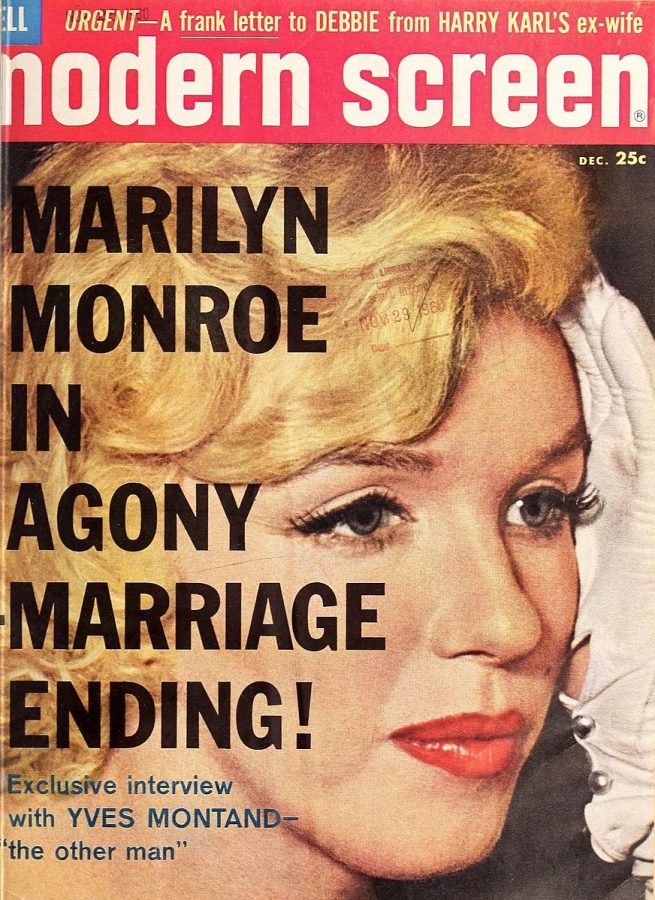‘Blonde’: still exploiting Marilyn Monroe 60 years after her death
Dell Publishing, Via Wikimedia Commons
Marilyn Monroe was on the cover of hundreds of tabloids over her short-lasting career, many jumping at the drama surrounding her marital status.
Forced abortions, a talking fetus and a largely fictional story.
Netflix’s “Blonde” is based on a novel of the same name by Joyce Carol Oates, which, the author stressed in an interview, was not meant to be a biography. The film is advertised as a biopic of the life of Norma Jeane Baker, also known as Marilyn Monroe.
Biopics provide information about the lives and legacies of those who have made significant achievements, or those who have done terrible things. But “Blonde” being framed as a biopic, or as being directly based on Monroe, is misleading, and fails to capture the elements of her life that shaped as her person.
When someone watches this movie, there is no way to distinguish fictional events from reality. This wouldn’t be as much of an issue if the film weren’t marketed as a realistic depiction of Monroe’s life.
Take for example the abortions, arguably the most controversial part of the movie.
In the film, Monroe, played by Ana de Armas, is offered a significant role and decides to get an abortion to take it. She is set up with a ride to the clinic, changes her mind midway, and is then physically forced to follow through with the abortion.
Later on, she engages in an affair with the president and gets pregnant, and then agents break into her house, kidnap her and perform another abortion against her will.
“Any talk of pregnancy termination is an assumption on our part,” ac to historian Michelle Vogel, author of “Marilyn Monroe: Her Films, Her Life,” in an interview with USA Today. “Marilyn loved children and was desperate to be a mother.”
There is no proof that Monroe had any abortions, period, nor was she forced to have any at any point in her life.
The abortion storyline takes the shape of a 3D fetus occasionally displayed on the screen, and crudely pushes a pro-life narrative based on events that never happened. It also associates Marilyn Monroe with events and issues that were never part of her life in the way “Blonde” depicts them. In the film, the guilt over her abortions follows Monroe throughout the movie and leads to lapses in mental health.
One of the most prominent anti-abortion arguments that comes to mind revolves around the guilt of “killing” a child, and possibly “killing” the next Albert Einstein or Bill Gates. The criticism of “Blonde” isn’t to say that people who have abortions never experience guilt, and that no one has ever been forced to have an abortion. Still, the depiction of this guilt and pain in “Blonde” further stigmatizes abortion access for people who may need it—and, as far as we know, Marilyn Monroe did not.
“Blonde” director Andrew Dominik told TheWrap that the film likely wouldn’t have been called an anti-abortion film had it been released five years ago, because people are currently looking at everything through the lens of the loss of Roe v. Wade. This exemplifies the increasing polarization of something that’s been an issue for decades.
The lens of fear tends to get a rise out of people on the Internet. However, as times change, so do the limits of how far one can take harmful depictions. “Blonde” will still exist, no matter what, but its harmful repercussions can be recognized and called out instead of being ignored and overlooked.
Because the movie was marketed as a biopic, the belief that Marilyn Monroe was forced to have abortions became tied to her real life. Even the US Weekly’s headline for the movie, which labels the film as a biopic, is harmful.
Marilyn Monroe was often seen as an object for men to manipulate throughout her career, and she continues to be exploited over half a century later.
Norma Jeane Baker may have put on a glamorous persona as Marilyn Monroe, but she was more than a mentally ill actress. She was more than her hair and curvy figure, and more than enough time has passed for the film and media industries to stop treating her as if she were just a fictional character who can be played with after purchasing the rights to tell her story.











